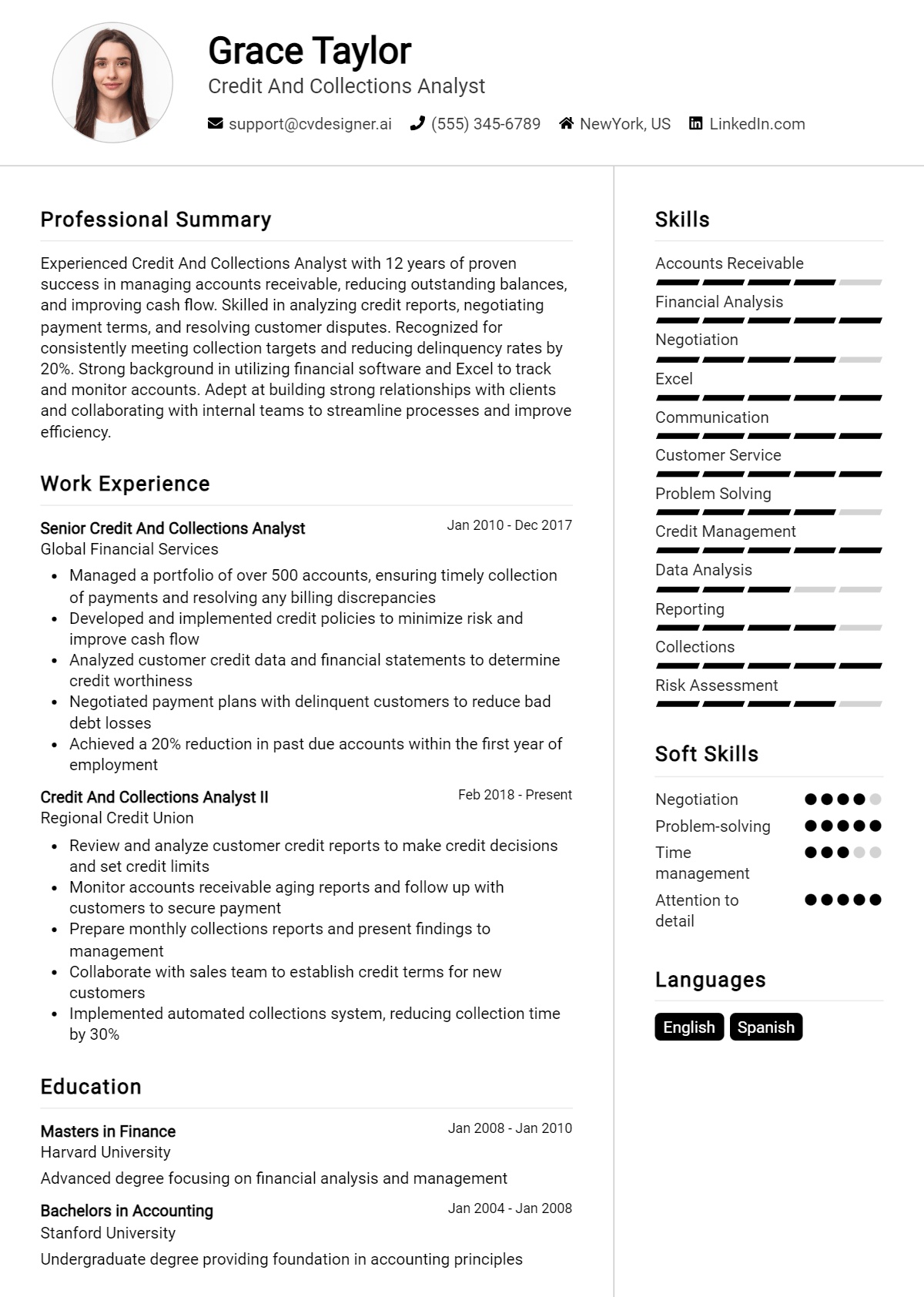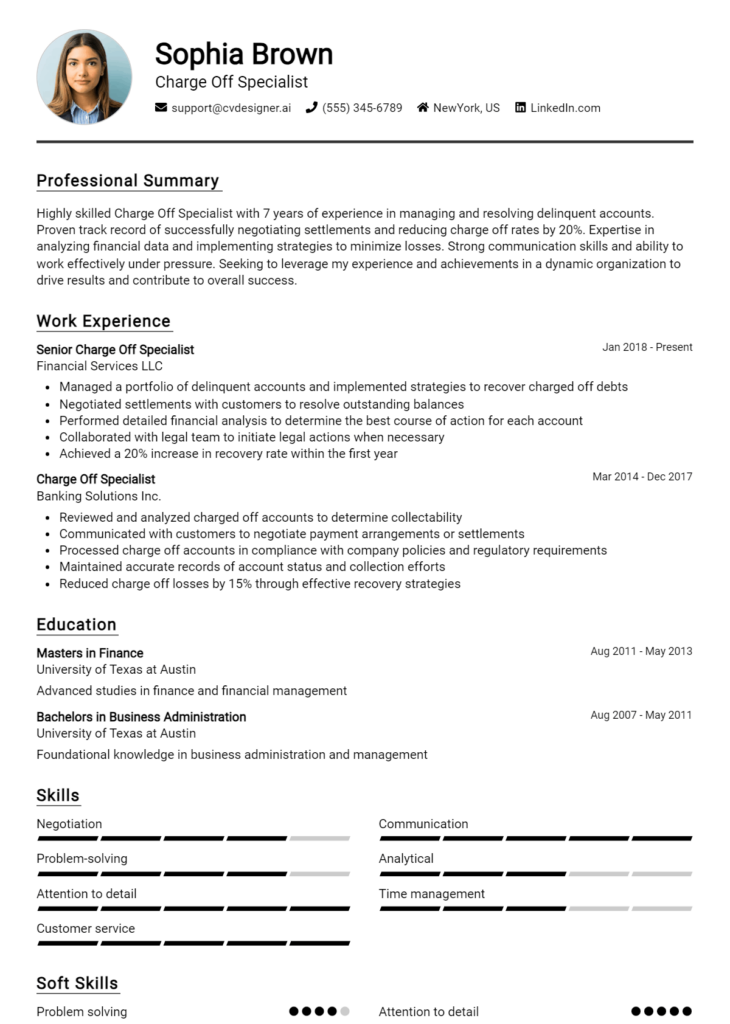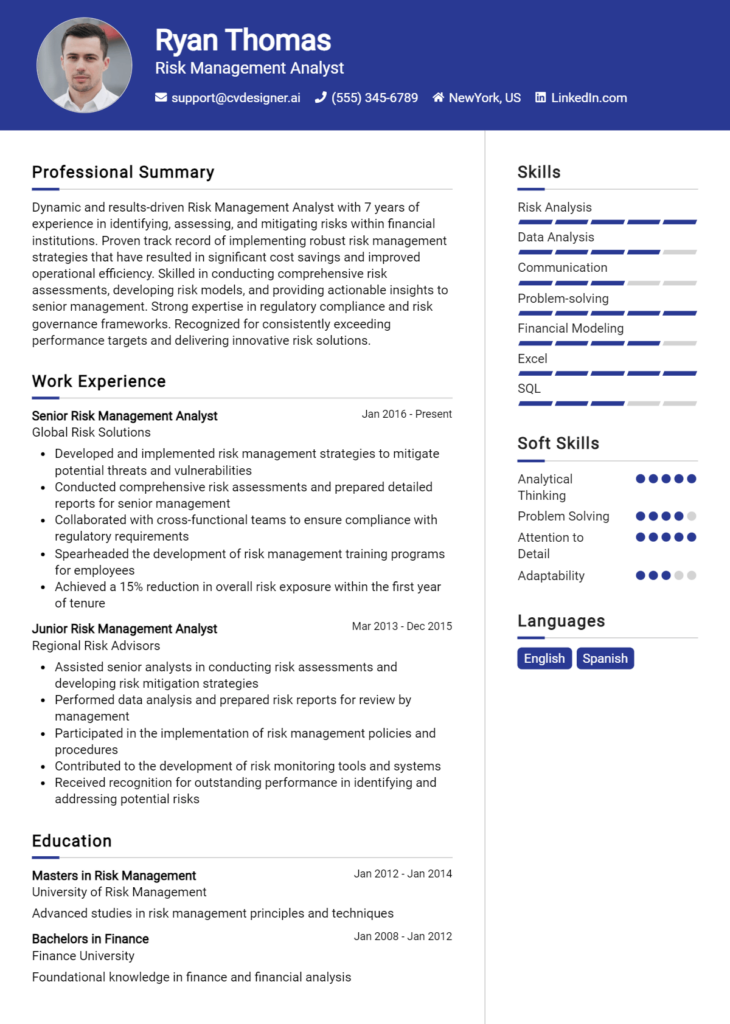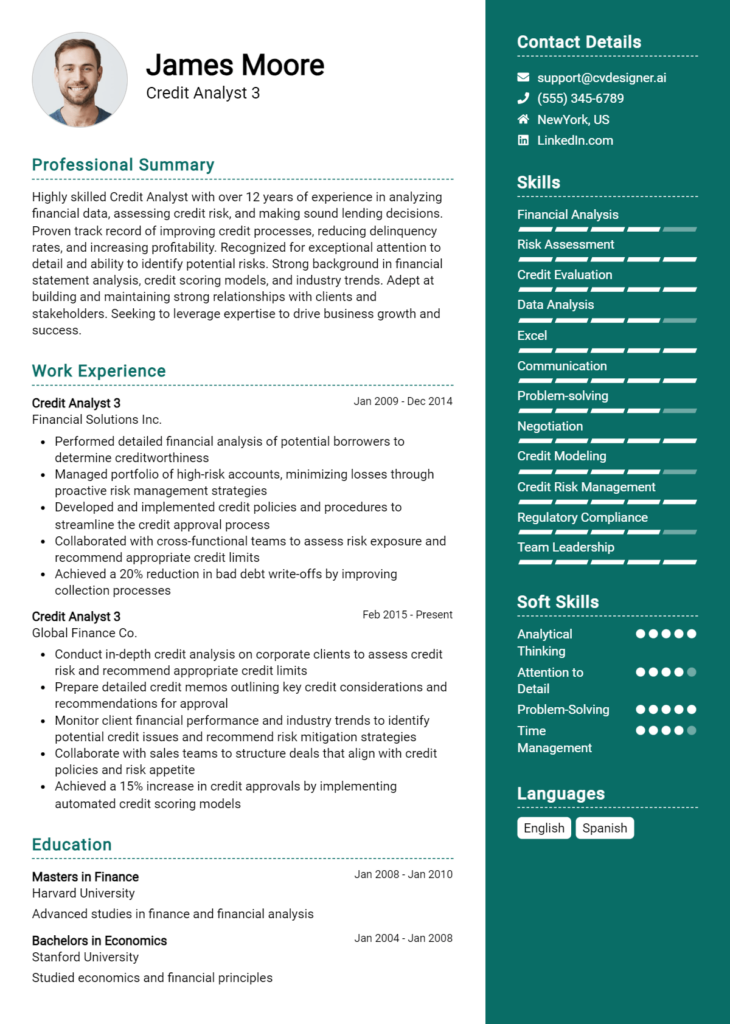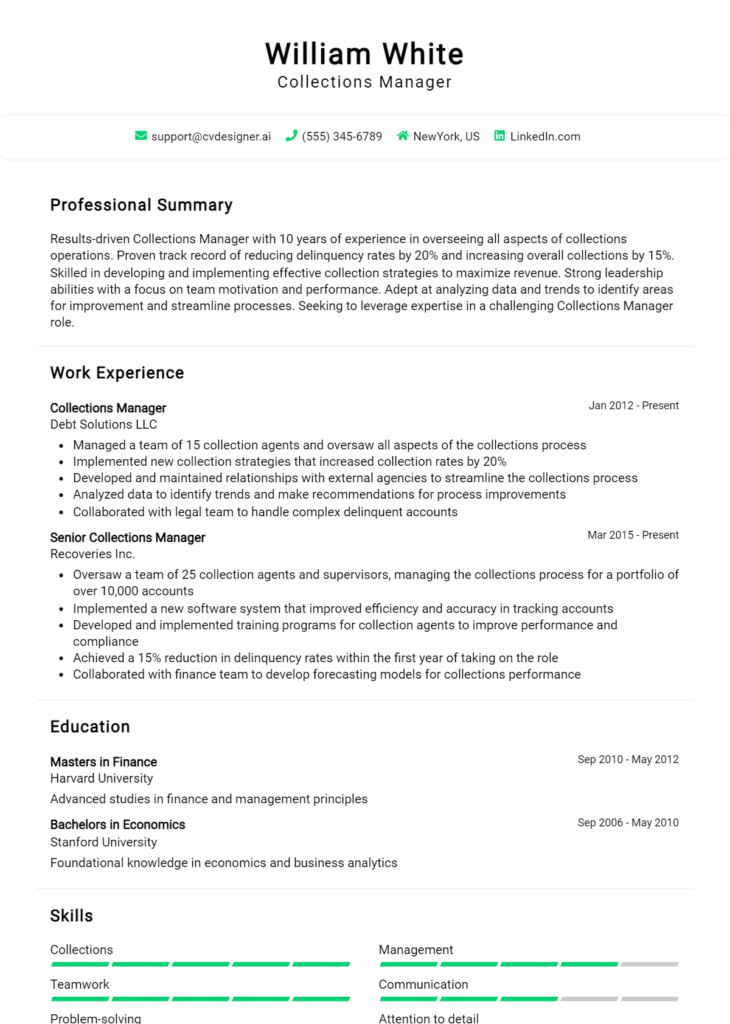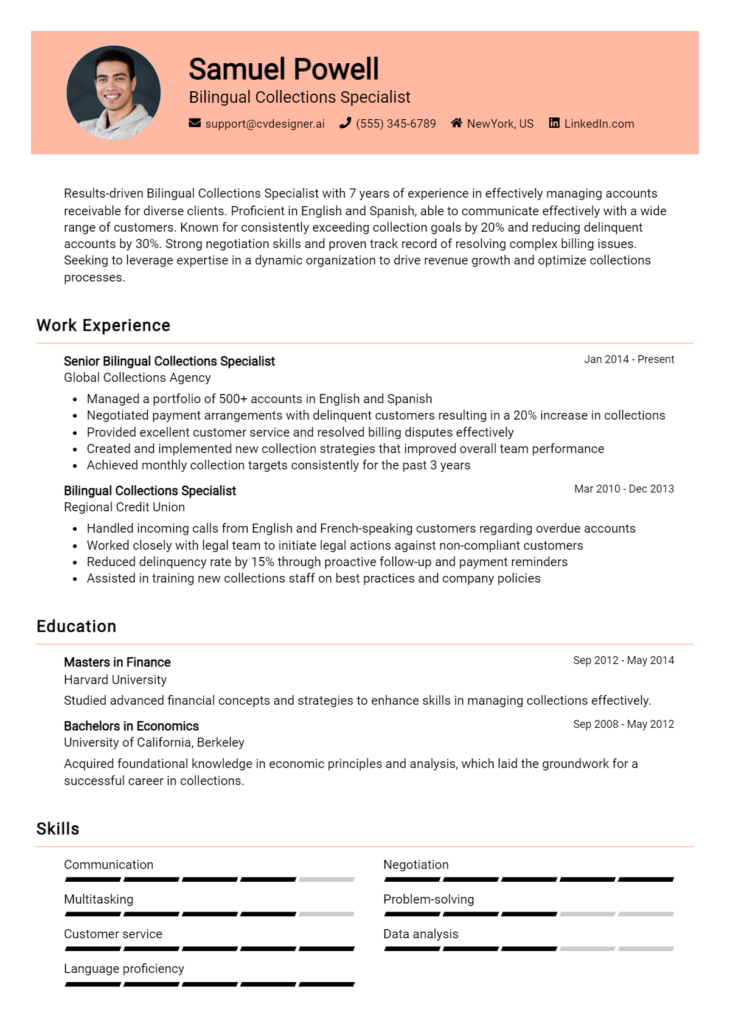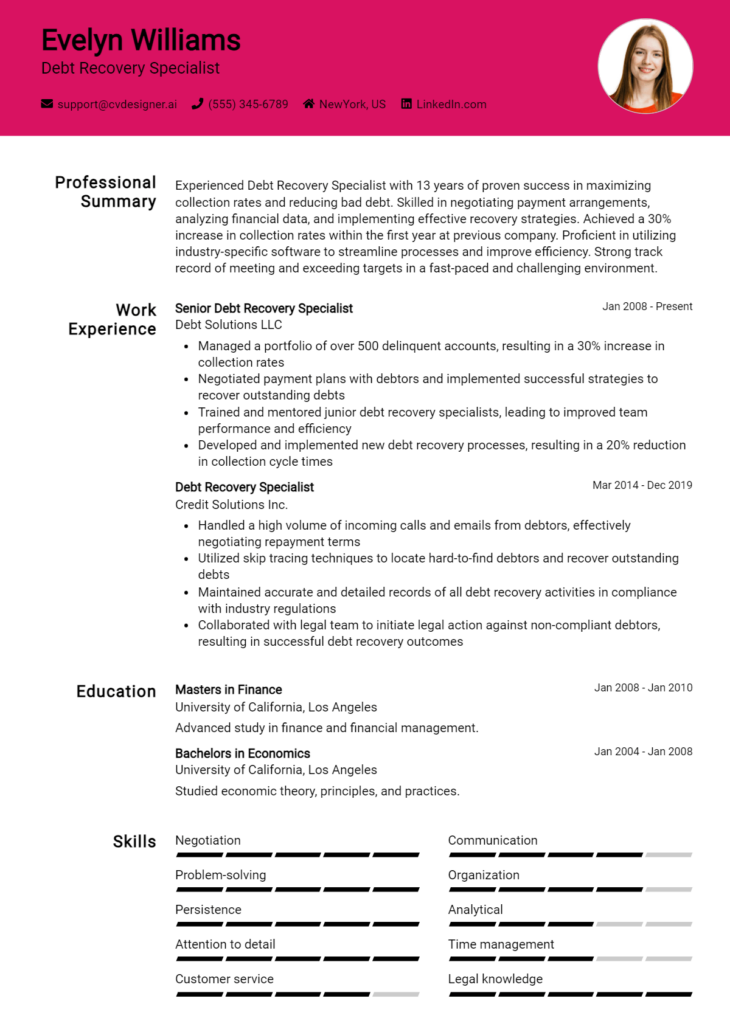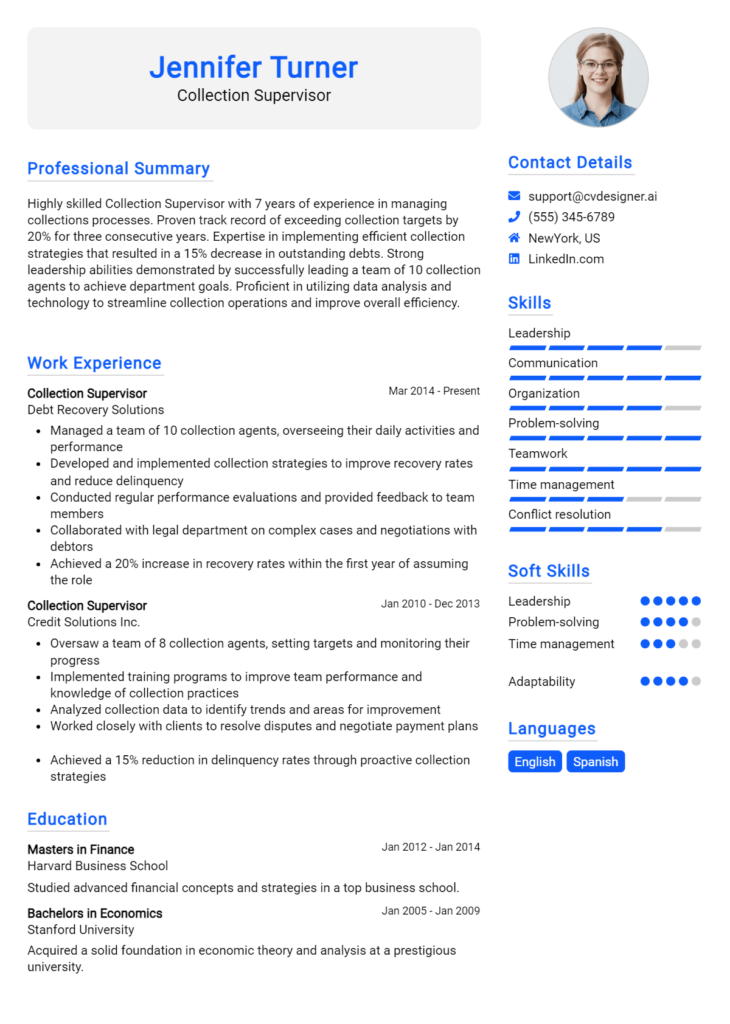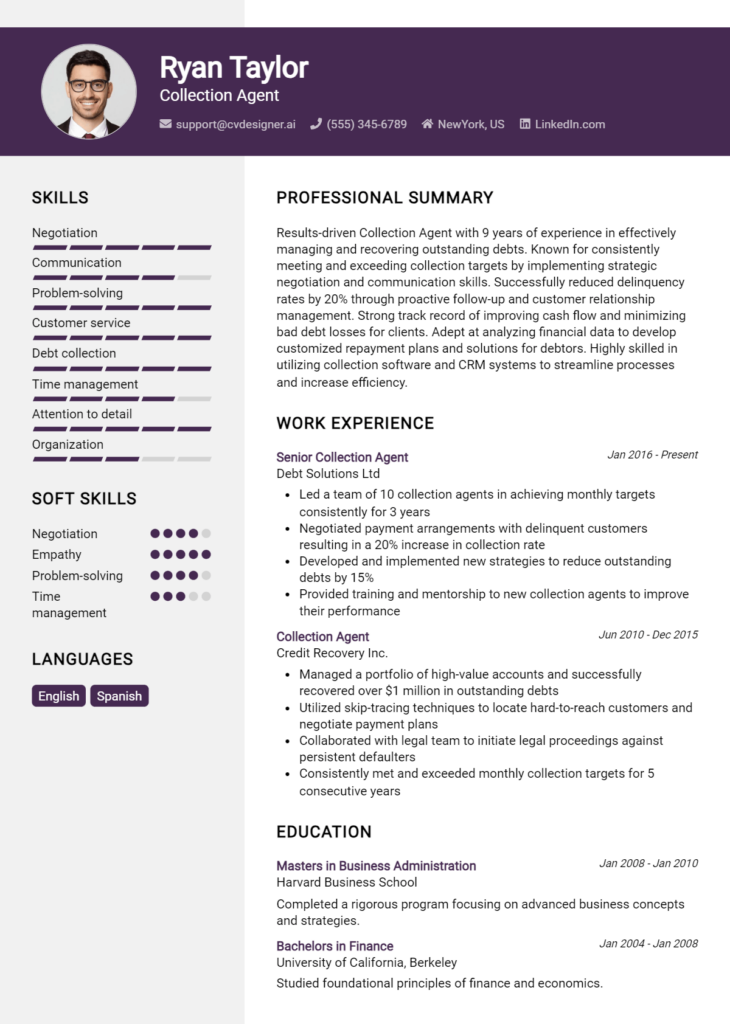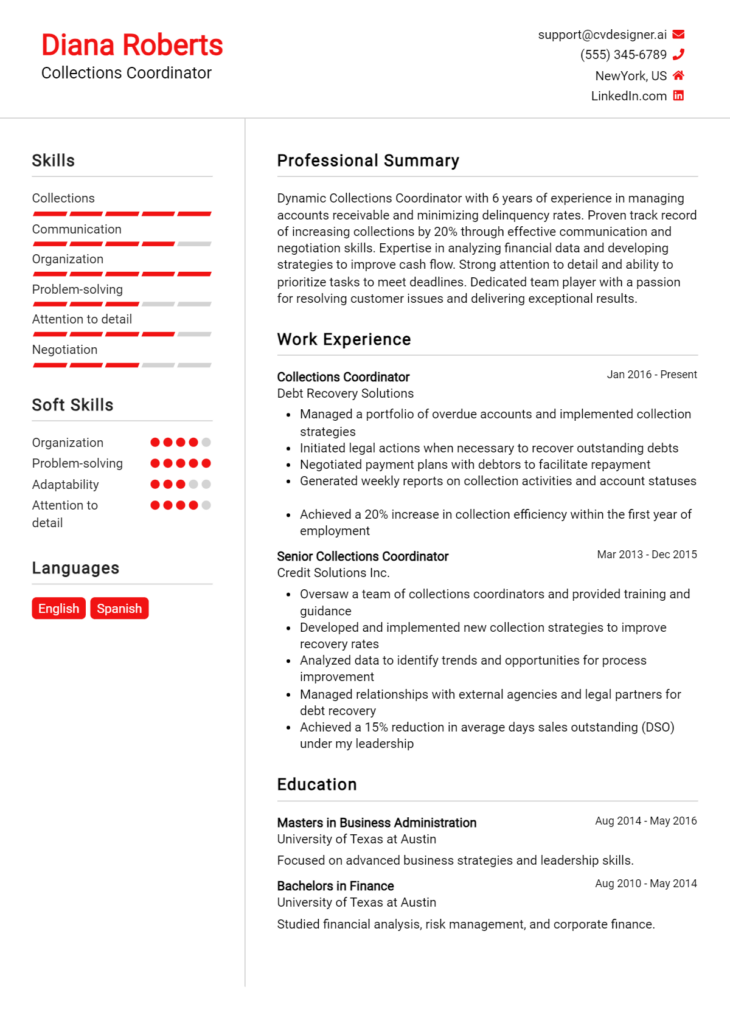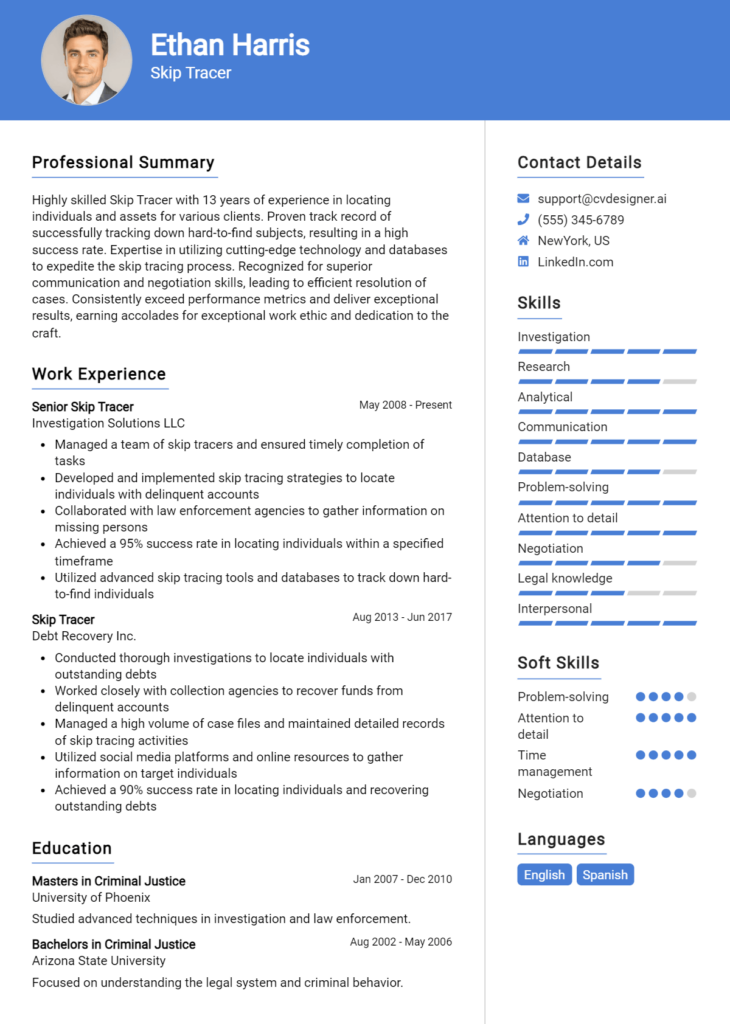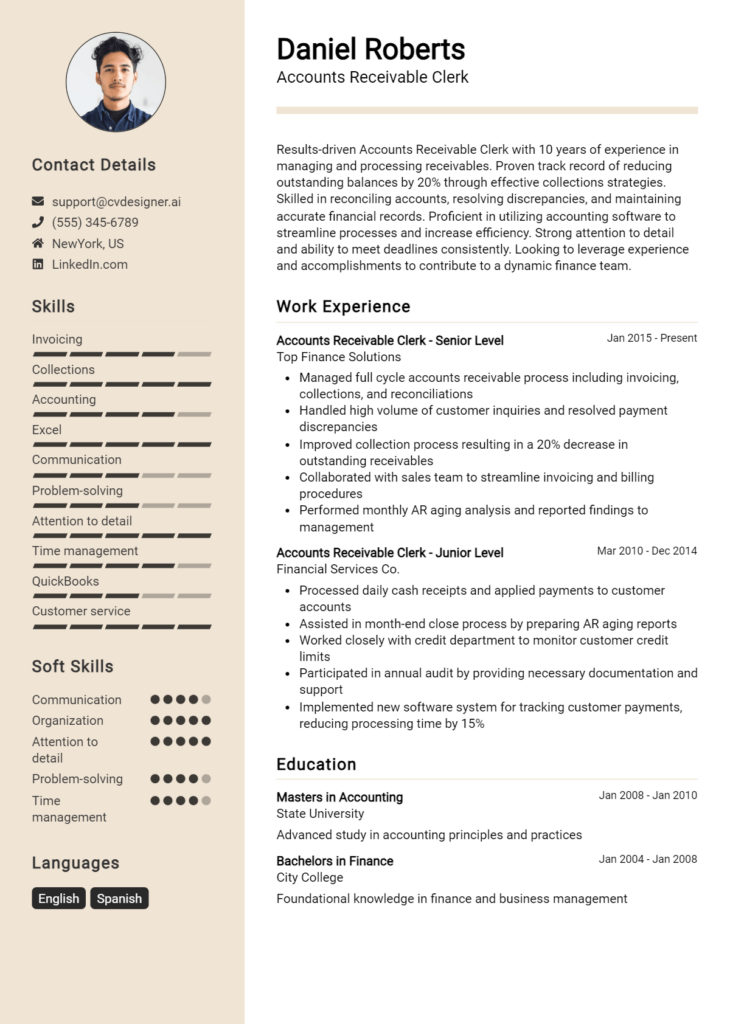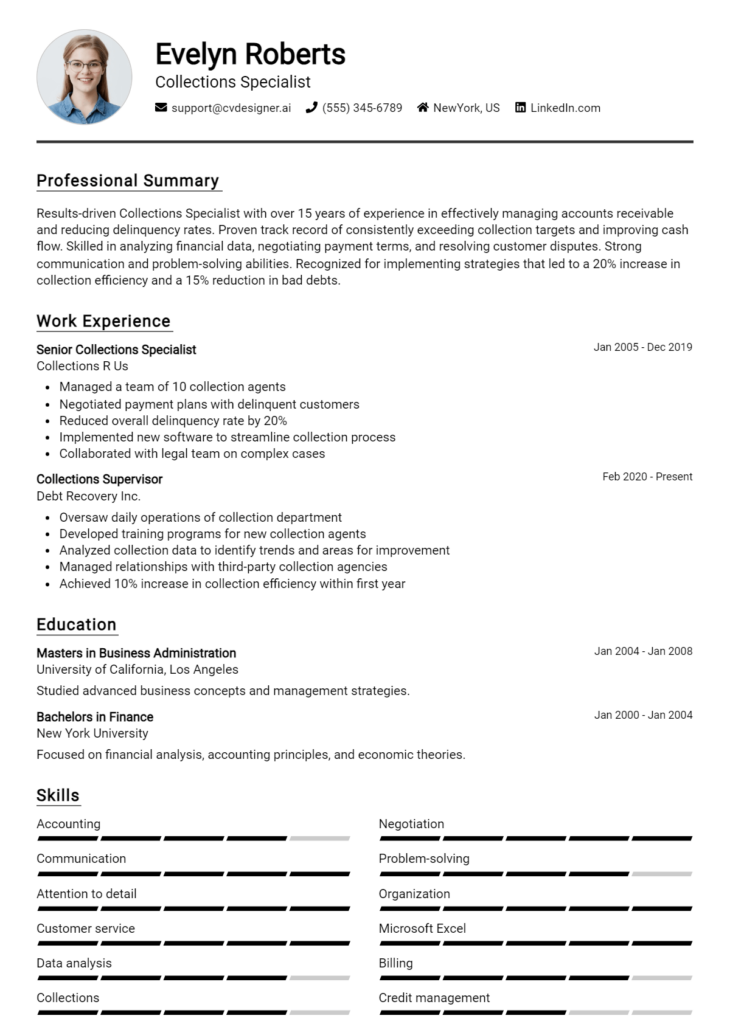Credit and Collections Analyst Core Responsibilities
A Credit and Collections Analyst plays a crucial role in ensuring the financial health of an organization by managing outstanding receivables and maintaining cash flow. Key responsibilities include analyzing credit data, assessing risk, and developing collection strategies while collaborating with sales and finance departments. Successful analysts possess strong technical skills, operational insight, and exceptional problem-solving abilities. These competencies contribute significantly to organizational objectives, and a well-structured resume can effectively highlight these qualifications to prospective employers.
Common Responsibilities Listed on Credit and Collections Analyst Resume
- Analyze credit applications and financial statements to assess creditworthiness.
- Monitor accounts receivable aging reports to identify overdue accounts.
- Develop and implement collection strategies to minimize outstanding debts.
- Communicate with clients to negotiate payment terms and resolve disputes.
- Prepare reports on collections performance and cash flow projections.
- Coordinate with sales teams to align credit policies with business goals.
- Maintain accurate records of customer interactions and payment histories.
- Ensure compliance with regulatory requirements related to collections.
- Identify trends in payment behavior to improve collection efficiency.
- Assist in the development of credit policies and procedures.
- Train and mentor junior staff on credit and collections best practices.
High-Level Resume Tips for Credit and Collections Analyst Professionals
In today’s competitive job market, a well-crafted resume is crucial for Credit and Collections Analyst professionals looking to make a strong impression. Your resume acts as the first point of contact with potential employers, showcasing not only your skills and accomplishments but also your understanding of the industry. A carefully tailored resume can set you apart from other candidates by clearly outlining your qualifications and demonstrating your value to the organization. This guide will provide practical and actionable resume tips specifically designed for Credit and Collections Analyst professionals, ensuring that your application stands out in a crowded field.
Top Resume Tips for Credit and Collections Analyst Professionals
- Tailor your resume to the specific job description by incorporating relevant keywords and phrases that align with the role.
- Highlight your experience in credit analysis, collection strategies, and risk assessment to showcase your expertise.
- Quantify your achievements by including metrics such as percentage of debt collected, reduction in delinquency rates, or improvements in cash flow.
- Emphasize your familiarity with industry-specific software tools, such as ERP systems or collection management software.
- Showcase your analytical skills by detailing your ability to assess creditworthiness and make informed decisions.
- Include any relevant certifications, such as Credit Business Associate (CBA) or Certified Credit and Collection Professional (CCCP).
- Demonstrate your communication skills by mentioning experiences where you successfully negotiated payment plans or resolved disputes.
- Highlight your teamwork and collaboration abilities, especially in relation to working with cross-functional teams to manage accounts receivable.
- Use a clean, professional format that enhances readability and ensures that key information can be easily identified.
By implementing these tips, you can significantly increase your chances of landing a job in the Credit and Collections Analyst field. A thoughtfully designed resume not only showcases your qualifications but also demonstrates your commitment to the role, making you a more attractive candidate to potential employers.
Why Resume Headlines & Titles are Important for Credit and Collections Analyst
In the competitive landscape of job applications, particularly for a Credit and Collections Analyst position, the importance of resume headlines and titles cannot be overstated. A well-crafted headline serves as a powerful tool that captures the attention of hiring managers, allowing them to quickly grasp a candidate's key qualifications and expertise in a succinct manner. A strong headline should be concise, relevant, and directly aligned with the job being applied for, enabling candidates to stand out in a crowded field and making a lasting impression right from the start.
Best Practices for Crafting Resume Headlines for Credit and Collections Analyst
- Keep it concise: Aim for a headline that is brief yet informative, ideally one to two lines long.
- Be role-specific: Tailor your headline to the Credit and Collections Analyst position, highlighting relevant skills or experiences.
- Use impactful language: Choose strong, action-oriented words that convey your expertise and achievements.
- Highlight key qualifications: Include specific skills or certifications that are pertinent to the role, such as knowledge of financial regulations or software proficiency.
- Avoid jargon: Use clear and straightforward language to ensure your headline is easily understood by hiring managers.
- Prioritize relevancy: Focus on qualifications that align closely with the job description to demonstrate your fit for the role.
- Make it unique: Differentiate yourself from other candidates by incorporating specific achievements or experiences that showcase your capabilities.
- Consider keywords: Incorporate industry-specific keywords that can help you get noticed in applicant tracking systems.
Example Resume Headlines for Credit and Collections Analyst
Strong Resume Headlines
"Results-Driven Credit and Collections Analyst with 5+ Years of Experience in Reducing DSO by 20%"
“Detail-Oriented Analyst Specializing in Accounts Receivable Management and Risk Assessment”
"Proven Track Record of Successfully Recovering Overdue Accounts and Enhancing Cash Flow"
“Experienced Collections Specialist with Expertise in Negotiating Payment Plans and Managing Client Relationships”
Weak Resume Headlines
“Credit and Collections Analyst”
“Professional with Experience in Finance”
Strong headlines are effective because they convey specific skills and accomplishments, immediately informing hiring managers of the candidate's unique qualifications and value proposition. In contrast, weak headlines fail to impress because they are vague and non-specific, lacking the detail necessary to distinguish a candidate in a competitive job market. By incorporating impactful language and relevant details, strong headlines can significantly enhance a resume's appeal.
Writing an Exceptional Credit and Collections Analyst Resume Summary
A resume summary is a critical component for a Credit and Collections Analyst, serving as the first impression a candidate makes on hiring managers. An exceptional summary encapsulates key skills, relevant experience, and noteworthy accomplishments, allowing the candidate to stand out in a competitive job market. It should be concise and impactful, offering a snapshot of the applicant's qualifications that directly relate to the specific job they are applying for. By effectively highlighting strengths and results, a well-crafted resume summary can quickly capture the attention of employers and set the tone for the rest of the application.
Best Practices for Writing a Credit and Collections Analyst Resume Summary
- Quantify achievements to demonstrate impact, such as percentages of debt recovery or reduced aging receivables.
- Focus on relevant skills, including proficiency in financial software, negotiation techniques, and analytical abilities.
- Tailor the summary to the specific job description, aligning keywords and responsibilities from the posting.
- Keep it concise, ideally between 2-4 sentences, to maintain the reader's attention.
- Showcase specific accomplishments, such as successful collection campaigns or improvements in cash flow management.
- Use action verbs to convey confidence and proactivity in your role.
- Highlight industry knowledge, such as familiarity with regulatory requirements or credit risk assessment.
- Maintain a professional tone and avoid overly casual language to reflect your seriousness about the position.
Example Credit and Collections Analyst Resume Summaries
Strong Resume Summaries
Dynamic Credit and Collections Analyst with over 5 years of experience in optimizing cash flow and reducing delinquency rates by 30%. Proficient in using SAP and Oracle for data analysis and reporting, alongside strong negotiation skills that have successfully resolved over $2 million in outstanding receivables.
Detail-oriented financial professional with expertise in credit evaluation and collections processes. Achieved a 25% increase in collection efficiency through the implementation of new tracking systems, while also maintaining compliance with industry regulations and enhancing customer relationships.
Results-driven Credit and Collections Analyst with a proven track record of managing high-volume portfolios, recovering 95% of overdue accounts within 60 days. Strong analytical skills combined with advanced Excel capabilities have enabled the identification of trends that inform strategic decision-making.
Weak Resume Summaries
Experienced analyst looking for a job in collections. I have worked in financial services and I am good with numbers.
Credit professional with some experience in collections. I am a team player and can help improve processes.
The strong resume summaries are considered effective because they are specific, quantify results, and highlight relevant skills that align with the Credit and Collections Analyst role. They present a clear picture of the candidate's achievements and capabilities, making a compelling case for their suitability for the position. In contrast, the weak summaries lack detail and fail to demonstrate measurable outcomes or the candidate's direct impact, making them less appealing to hiring managers.
Work Experience Section for Credit and Collections Analyst Resume
The work experience section of a Credit and Collections Analyst resume is critical in demonstrating a candidate's proficiency in managing credit and collections processes, as well as their technical skills and leadership capabilities. This section serves as a platform to showcase not only the candidate's past roles and responsibilities but also their ability to deliver high-quality results that align with industry standards. By quantifying achievements and detailing specific contributions to team success, candidates can effectively illustrate their value to potential employers. Hence, aligning work experience with measurable outcomes is essential to stand out in a competitive job market.
Best Practices for Credit and Collections Analyst Work Experience
- Highlight relevant technical skills, such as proficiency in ERP systems or collections software.
- Quantify achievements with specific metrics, such as percentage of debt recovered or reduction in days sales outstanding (DSO).
- Detail collaborative efforts, such as working cross-functionally with sales or finance to improve collection processes.
- Emphasize leadership roles taken within projects or teams, showcasing your ability to guide and mentor others.
- Utilize action verbs to convey a sense of proactivity and effectiveness in your contributions.
- Tailor the experience descriptions to align with the requirements of the job you are applying for.
- Include any relevant certifications or training that bolster your credibility in the field.
- Maintain clarity and conciseness to ensure that key information is easily digestible to hiring managers.
Example Work Experiences for Credit and Collections Analyst
Strong Experiences
- Successfully reduced the average DSO from 45 to 30 days, resulting in a 20% increase in cash flow.
- Led a team of 5 in implementing a new collections strategy that improved recovery rates by 35% within 6 months.
- Utilized SQL to analyze client data, identifying high-risk accounts and reducing bad debt by 15% year-over-year.
- Collaborated with the sales department to develop a streamlined credit approval process, enhancing customer satisfaction and reducing approval time by 50%.
Weak Experiences
- Responsible for collections and managing accounts.
- Worked on improving processes related to credit analysis.
- Involved in team meetings to discuss debt recovery efforts.
- Assisted in various projects related to credit management.
The examples of strong experiences are considered effective as they provide specific, quantifiable outcomes that demonstrate the candidate's capability to deliver results and lead initiatives. They highlight not only individual accomplishments but also collaborative efforts that had a significant impact on the organization. In contrast, the weak experiences lack detail and measurable outcomes, making them vague and unimpressive. These statements do not convey the candidate's skills or contributions clearly, which makes it difficult for potential employers to assess their qualifications and fit for the role.
Education and Certifications Section for Credit and Collections Analyst Resume
The education and certifications section of a Credit and Collections Analyst resume plays a critical role in showcasing a candidate's academic achievements and professional qualifications. This section highlights the candidate's foundational knowledge in finance, accounting, and credit management, as well as any industry-specific training that enhances their skill set. By detailing relevant coursework, certifications, and continuous learning efforts, candidates can significantly boost their credibility and demonstrate their commitment to staying updated in a dynamic field. Strong educational credentials and recognized certifications can set a candidate apart, aligning their qualifications with the specific demands of the job role.
Best Practices for Credit and Collections Analyst Education and Certifications
- Include only relevant degrees that align with credit and collections roles, such as finance, accounting, or business administration.
- List industry-recognized certifications, such as Certified Credit and Collection Specialist (CCCS) or Certified Accounts Receivable Professional (CARP).
- Provide details about relevant coursework that demonstrates specialized knowledge in credit risk analysis or collections strategies.
- Highlight ongoing education, such as workshops or online courses, to show commitment to professional development.
- Use clear formatting to enhance readability, making it easy for hiring managers to identify key qualifications quickly.
- Include the date of completion for certifications to show that credentials are current and relevant.
- Prioritize achievements and certifications that have direct applications in the credit and collections field.
- Avoid listing outdated or irrelevant qualifications that do not contribute to the role of a Credit and Collections Analyst.
Example Education and Certifications for Credit and Collections Analyst
Strong Examples
- Bachelor of Science in Finance, University of ABC, 2020
- Certified Credit and Collection Specialist (CCCS), National Association of Credit Management, 2022
- Advanced Coursework in Credit Risk Management, University of XYZ, 2021
- Certificate in Accounts Receivable Management, Institute of Finance Professionals, 2023
Weak Examples
- Bachelor of Arts in English Literature, University of ABC, 2010
- Certification in Basic Computer Skills, 2015
- High School Diploma, 2008
- Outdated Certification in General Business Practices, 2010
The strong examples are considered effective because they reflect relevant degrees and industry-recognized certifications that directly apply to the Credit and Collections Analyst role, showcasing the candidate's preparedness for the position. In contrast, the weak examples highlight qualifications that are either not applicable to the field or outdated, which could detract from the candidate’s suitability for the role. Including strong and relevant educational credentials is essential for making a positive impression on potential employers.
Top Skills & Keywords for Credit and Collections Analyst Resume
A well-crafted resume for a Credit and Collections Analyst position is essential in showcasing your qualifications and potential to prospective employers. The right combination of skills not only highlights your technical capabilities but also emphasizes your ability to effectively communicate, negotiate, and manage relationships with clients. As the financial landscape continues to evolve, possessing both hard and soft skills is crucial for navigating the complexities of credit and collections. A strong resume will incorporate these skills to demonstrate your value and readiness to contribute to an organization's financial health. For further guidance on how to effectively present your skills and work experience, continue reading.
Top Hard & Soft Skills for Credit and Collections Analyst
Soft Skills
- Strong communication skills
- Negotiation abilities
- Problem-solving aptitude
- Attention to detail
- Time management
- Customer service orientation
- Analytical thinking
- Interpersonal skills
- Conflict resolution
- Adaptability
- Team collaboration
- Empathy
- Critical thinking
- Active listening
Hard Skills
- Proficiency in accounting software (e.g., QuickBooks, SAP)
- Knowledge of credit and collections laws
- Financial analysis and reporting
- Data analysis and interpretation
- Experience with CRM systems
- Microsoft Excel expertise
- Knowledge of credit scoring models
- Billing and invoicing processes
- Risk assessment capabilities
- Familiarity with payment processing systems
- Database management
- Financial modeling
- Collection strategies and techniques
- Understanding of financial statements
- Regulatory compliance knowledge
Stand Out with a Winning Credit and Collections Analyst Cover Letter
Dear [Hiring Manager's Name],
I am writing to express my interest in the Credit and Collections Analyst position at [Company Name] as advertised on [where you found the job listing]. With a solid background in financial analysis and a proven track record in credit management, I am confident in my ability to contribute effectively to your team. My experience in assessing credit risk and implementing collection strategies has equipped me with the skills necessary to enhance your organization's financial performance and minimize outstanding debts.
In my previous role at [Previous Company Name], I successfully managed a portfolio of accounts, ensuring timely payments and reducing delinquency rates by [specific percentage or amount]. I employed a combination of data analysis and relationship-building techniques to communicate effectively with clients, navigate payment disputes, and develop payment plans that were mutually beneficial. My analytical skills allow me to identify trends and potential credit risks, enabling proactive measures that protect the company's financial interests.
I am particularly drawn to [Company Name] because of [specific reason related to the company, such as its reputation, values, or growth opportunities]. I admire your commitment to [specific aspect of the company's mission or goals], and I am eager to bring my expertise in credit analysis and collections to help drive that vision forward. I am excited about the opportunity to collaborate with your team to optimize credit policies, improve collection processes, and ultimately contribute to the financial health of the organization.
Thank you for considering my application. I look forward to the opportunity to discuss my qualifications further and explore how I can add value to [Company Name] as a Credit and Collections Analyst. I am available at your earliest convenience for an interview and can be reached via [your phone number] or [your email address].
Sincerely,
[Your Name]
Common Mistakes to Avoid in a Credit and Collections Analyst Resume
When crafting a resume for a Credit and Collections Analyst position, it's essential to present your qualifications and experiences effectively. However, many candidates make common mistakes that can undermine their chances of landing an interview. By avoiding these pitfalls, you can create a compelling resume that highlights your suitability for the role. Here are some common mistakes to watch out for:
Generic Objective Statements: Using vague or generic objective statements fails to convey your specific interest in the role or the company, making your resume less impactful.
Lack of Quantifiable Achievements: Failing to include metrics or specific accomplishments can make it difficult for employers to gauge your effectiveness. Use numbers to illustrate your success in improving collections or reducing outstanding debts.
Ignoring Relevant Skills: Not highlighting key skills relevant to credit and collections, such as financial analysis, problem-solving, or communication, can lead to your resume being overlooked by hiring managers.
Overly Complex Language: Using jargon or overly technical language can confuse the reader. Aim for clarity and conciseness to ensure your qualifications are easily understood.
Inconsistent Formatting: A resume with inconsistent font sizes, colors, or layout can appear unprofessional. Maintain a clean and uniform format throughout your document to enhance readability.
Failure to Tailor the Resume: Submitting a one-size-fits-all resume without tailoring it to the specific job description can signal a lack of genuine interest in the position.
Neglecting to Proofread: Typos and grammatical errors can detract from your professionalism. Always proofread your resume multiple times and consider having a friend review it as well.
Excessive Length: A lengthy resume can overwhelm hiring managers. Aim for a concise, focused document that highlights your most relevant experiences and skills, ideally fitting within one page.
Conclusion
As a Credit and Collections Analyst, your role is crucial in managing an organization's cash flow and minimizing financial risks. You are responsible for analyzing credit data, assessing creditworthiness, managing collections processes, and ensuring timely payments from clients. Key skills for this position include strong analytical abilities, attention to detail, effective communication, and proficiency in financial software.
In today's competitive job market, having a standout resume is essential for showcasing your qualifications and experience effectively. It's important to tailor your resume to highlight your specific achievements in credit analysis and collections management. Ensure that your experience, skills, and accomplishments are presented clearly and concisely to attract the attention of potential employers.
To help you create an impressive resume, consider utilizing various resources that can enhance your job application. Explore the available resume templates to find a design that suits your professional style. Use the resume builder for an easy step-by-step process to craft your document, and check out resume examples for inspiration on how to present your experience effectively. Additionally, if you're in need of a cover letter, the cover letter templates can provide a solid foundation for your introductory correspondence.
Now is the perfect time to review and update your Credit and Collections Analyst resume. Take advantage of these tools to ensure that your resume stands out and accurately reflects your skills and experiences in this vital field.

